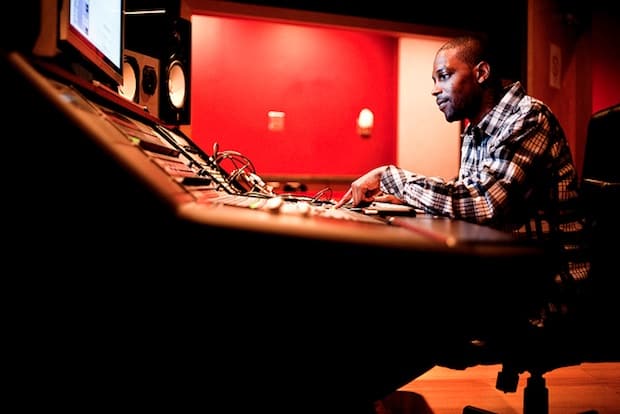As crucial as the producer is, they're not the only set of ears in the studio. For this installment of Beat Construction we go further down the hip-hop assembly line to talk to an even less heralded contributor—the engineer. The Kentucky-bred, Atlanta-based KY Engineering, who has manned the boards for the likes of Lil Wayne, Waka Flocka and 2 Chainz, broke down the specifics of his grind for us.
Can you break down the role of the engineer for those who don't know? There are two kinds of engineers. You have the recording engineer and a mixing engineer. I'm both. The recording engineer is the guy that sits at the board or the computer and records the track as the artist lays the it. He gets all the vocals and he records them on the beat. Now a mixing engineer, that's the guy who gives you the final product, what you hear on the radio and on the CD. That [involves] sitting there and going through everything. You have the whole beat tracked out to where you have the kick on a separate track, you have the bass on a separate track, snare, etc. so you can blend everything and make it sound good. [The goal is to] get each sound to have its own space, so you can hear everything.
How did you get into engineering? Really just through my friends. When I was in high school in Lexington, Kentucky all of my friends were rappers. I never wanted to actually rap but I loved music so much. When I was younger I'd go to the record store every Friday, buy music and I really would analyze it. At that point I didn't really know I wanted to be an engineer but I was just going to the studio with my friends. Eventually I ended up getting a small [studio] setup in my garage when I was in high school, and it just went from there.
When did it become a professional thing? In 2001 the friends I was recording with, Bonafide Circle, ended up with an independent deal down here in Atlanta and that company moved them into a house. They had a studio in the house that they wasn't using because they didn't know how to use any of the equipment. So I moved down, and I didn't exactly know what I was doing at that point as far as a that kind of equipment, but I just sat there and sat there and sat there. I kept messing with it. The recordings wasn't very good at first. The hooks would be off, the vocals didn't really sound too good. But I was trying and the people was at least giving me a chance to do it. I was there for three years doing that, things didn't work out, people wasn't seeing eye to eye. On a day-to-day basis I didn't really have no job and I wasn't really making money engineering. I was basically broke and I had to move back to Kentucky.
The minute I hit Kentucky I just got to working. I was cleaning buildings, the other job I had was called Cinematech and I would just go in and hook up all the cinema equipment in new movie theaters—the projectors, the speakers behind the wall that nobody ever sees. I was just working for like a year and a half. Another friend of mine, Rob Jackson, he had ended up catching an independent deal in Atlanta. He was working at a studio called Hot Beats and I came back down and would go in there and record him. The owner came in one day and asked me if I worked with other people and I was like, "yeah." So he called me and I went back in with Cardan from Harlem World. That was my very first session working with anybody and getting paid. It took off from there really. I was working at Hot Beats for two or three years and that's when I met Lil Wayne. When I started working with Wayne, things really really started taking off. I ended up moving to Miami and living [there] for about two years, dealing with Wayne. I worked on Rebirth with him, I worked on Carter III, I'm Not A Human Being, the Young Money album.
What's Wayne's vibe like in the studio? Wayne's a studio genius, to be real. I probably learned the bulk of what I know from him. He doesn't know exactly what it is that I'm doing on Pro Tools, technically, but he's been the studio so much that [it's natural]. If he looks at his waveform he'll know what word it is. And I'm not gonna lie, I sit at Pro Tools all day and I can kinda give you a basic idea of where a word is but he'll know exactly. He'll point at the screen and say "that's where I said 'soul'." And he just knows what he wants. Most artists leave it up to the engineer. Wayne's gonna come out and tell you, "put flange on this, make this part do that." He's one of the only people I know that really works like that, that'll really be on you and trying to get the songs done. We'll hit the studio at about 11[PM] and we'll be there until 11[AM] the next day. Everyday. And this is a man who really doesn't have to go to the studio everyday. He's already done enough. He's working like he's a new artist.
With Wayne I was only a recording engineer [initially]. I mixed "Steady Mobbin" with Gucci and a few other songs but it really wasn't about mixing. It was about recording. But that's one thing that I learned from Wayne. He's the one that got me into mixing, because he would sit there for hours and work. We would would work so hard on a song that his vocals were basically mixed [already] before we even sent it out for a mix. The only thing I didn't have was the multitrack. I could play you the original copy of his vocals and they'd sound just as good as what you ended up hearing, because we worked so hard on them already.
How did you end up linking with Waka? I moved back to Atlanta [when Wayne] had to go and take his vacation, and Waka was working at a studio that I was working at. He didn't have an engineer. It's crazy, he was actually recording himself before I met him. He recorded "O Lets Do It" himself, somebody else mixed it, but he recorded it. We clicked instantly. He was just happy that I knew what I was doing and, outside of the studio, he was like, "you actually a cool person, I can deal with you. I can't deal with a lot of engineers."
How does Waka's process differ from Wayne's? Waka's process is more of a feeling thing. Waka's just gonna go in the booth, that's how he comes up with his stuff. When I first met him he was writing in his iPad, then as we went on he got into the process of how Wayne does his stuff - he just goes in the booth and says how he feels. That actually made him better. People are going to be surprised with this new album. It's definitely gonna be a progression from Flockaveli just as far as the way he delivers everything. You gotta understand too, Waka hasn't even been rapping more than three or four years total. So he's still trying to learn, he wants to learn and he's actually gotten better. At the same time, I don't want Waka being no Jay-Z or Nas because that's not what people even want out of him.
But there are certain things that we can do as far as making everything better. I make sure that his stuff is definitely gonna be banging. "Ghetto mixed" is what I like to call Waka's stuff. Sonically, I know how to make stuff sound crystal clear. I make his vocals sound that way so you can understand what he's saying, but as far as the 808s, the kicks and the drums, I try to keep them dirty. Almost to keep a mixtape feel, because that's what we like in the south. We like bass that's out of control. What he's talking about is very street so I don't want it sounding super poppy and crystal clear.
Well Flockaveli just sounds so heavy. You're gonna be the first person I ever told this to, but the studio that I mixed it in, the speakers that they have aren't conventional speakers. They were club speakers, JBLs. I mixed Flockaveli on club speakers. It worked because that album, the energy and the way that everything came across, it was just real club anyway. Everything came out sounding great. But just imagine what this new one's gonna be like, because I'm in the studio now with real-deal speakers.
I'm not really a technical kind of engineer. I'm not the guy that's gonna tell you, "put his verse on this many Hz on the highs, put it on -3dbs." I know what you're saying if you say it to me, but that's not how I really get things done. Mine is more of a feeling in the air kind of thing. I never went to school, I just know what I'm doing from years of doing it, just trial and error. This doesn't sound right, that does sound right. Each song's different, it's like starting over every single time. I don't care about templates. Even if you've got the same person's vocals, their voice is gonna be different on different beats. You're gonna have to tinker with stuff.
Do you take these records and try them out on different systems as you're doing this? Yeah, the mixing process for each song is probably like a two or three day process. Maybe about 10 to 15 hours per song. I just do it in the studio, but of course it'll sound one way in the studio and when you leave the studio it doesn't really sound like that. The studio always gives you a different sound than you would hear somewhere else. So I listen to it in my car. I got a little beat up system in the house and I listen to it in the house because I know if it sounds good on this little beat up system then it's gonna sound good when you get it in a big one.
Do you ever get sick of a song during this process? Sometimes, yeah. By the time I hear them and they're out in the public and I have to keep hearing it I'm like "uh… I done heard this song a million times." But at the same time, that's why I love what I do because it's still always fun to hear something that I created on the radio. Or maybe somebody might be beside me in their car and they don't even know that I helped make the song [that they're listening to]. They're sitting there vibing out and I just watch them. That's the drive, even more so than trying to get paid to do it. It's the satisfaction of just knowing you just created something that everybody's listening to. I'm not really a club person but I do like to go out to hear see how stuff that I made sounds in the club and see people's reaction to it.
Do you spend most of your time in the studio then? Yeah, I don't be out, I don't go anywhere. Everything I do is wake up, go to the studio. Wake up, go to the studio. Even buying food, I just get it when I'm at the studio. Especially right now, I'm super busy between Waka and 2 Chainz. I'm mixing all the Waka stuff now, and I've been doing all of the 2 Chainz stuff for like four or five years. I worked on both of the Playaz Circle albums. Me and 2 Chainz always had a good vibe. When I was working with Wayne, Wayne had the studio bus and 2 Chainz was on the bus with us. He would be riding with us and recording. I'm proud of him too, because he's the same thing as what I represent. Really two years ago I remember 2 Chainz wasn't doing anything. Nobody was trying to do no songs with him, he wasn't getting booked to do no shows. Now I don't see him at all really!
What do you think accounts for that recent success? My whole thing is about working. People think you just wake up and it happens. You gotta sacrifice stuff. It wasn't always good for Wayne, it wasn't always good for 2 Chainz, it wasn't always good for Waka. I wanted to wake up one day and be doing what I'm doing right now, but it didn't happen like that. I'm 32 now, it's been a long time. I didn't really get it going until I was like 27 or 28 and I was already doing it for ten years before that. I just had to be patient and a lot of people don't have that. Whatever it is that you do, you have to do it every day. Believe me, anybody that's successful that I know, and I know a lot of millionaires, all of them work. Lil Wayne's driving a Bugatti, a two-million-dollar car to the studio. But he's still going to the studio when he could just be driving around like, "I'm in a Bugatti, I'm gonna get ten million girls and I'mma go to the club." I mean, yeah he does go to the club sometimes. But guess where he's going after the club? He's going where he was at before the club, the studio.



